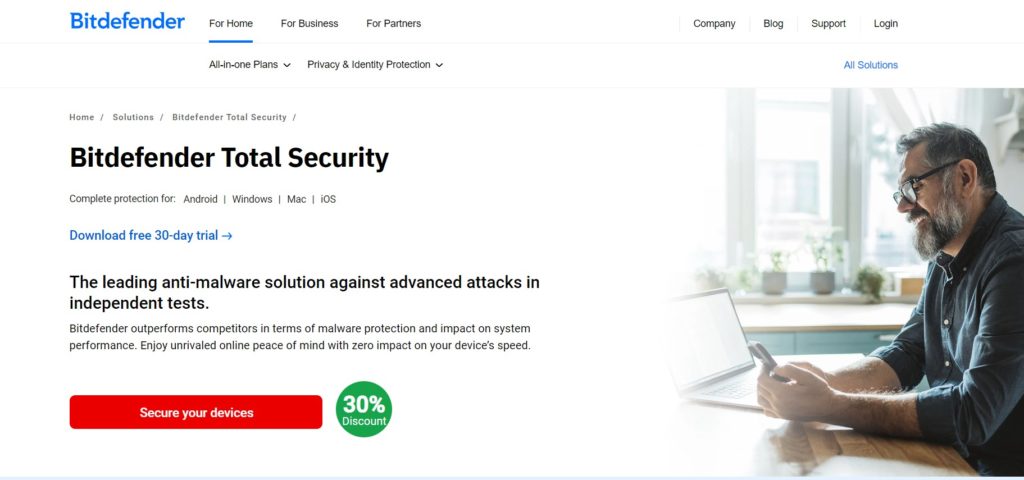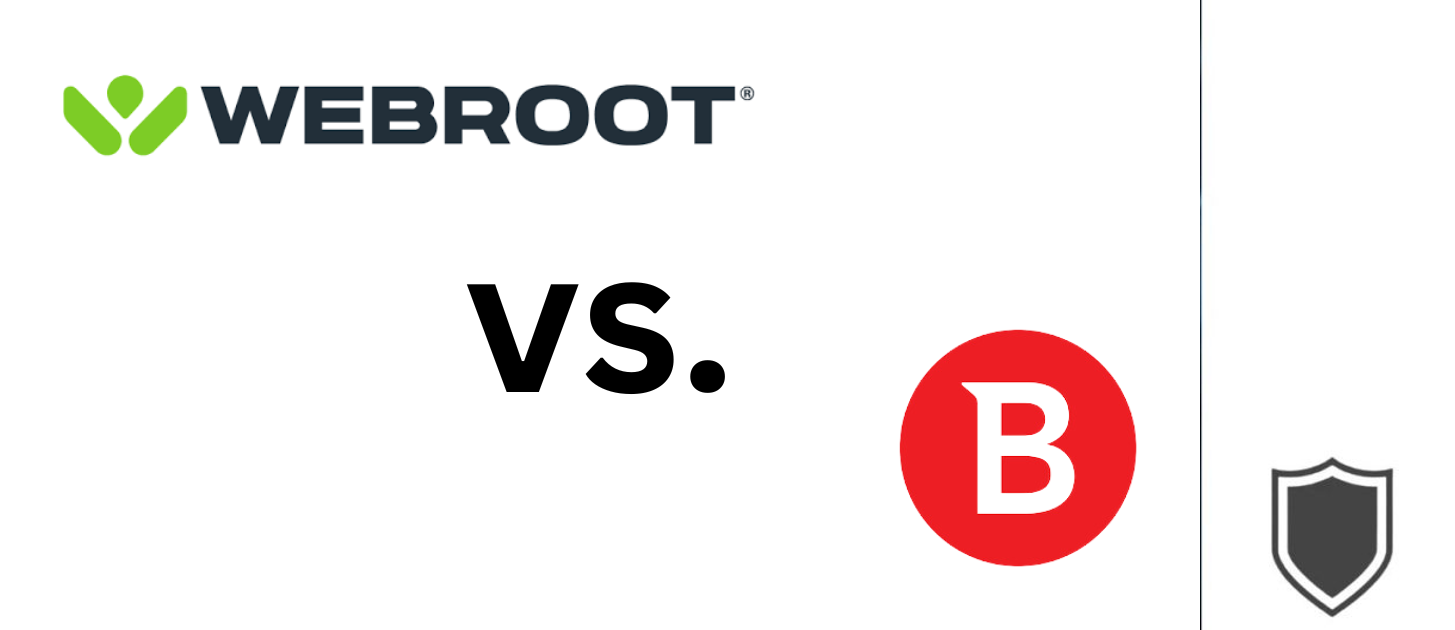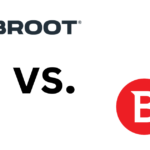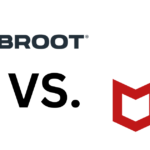When choosing antivirus software, it’s important to weigh the pros and cons of your options. In this article, we’re going to examine two top antivirus options, Webroot and Bitdefender. Both offer strong defense against online threats, but they differ in features, security bundles, price, and performance.
Webroot is known for its exceptionally quick scans, lightweight installation, and minimal system impact. On the other hand, Bitdefender boasts a robust approach to threat prevention, providing in-depth scans and a variety of protective features across different devices. With contrasting approaches to cybersecurity, we will evaluate how each antivirus performs in terms of protection, device compatibility, and overall security experience.
Key Takeaways
- Bitdefender and Webroot are both top-rated antivirus solutions with different approaches to protection.
- Comparison of features, security suites, and pricing will help you determine the best option for your needs.
- Performance in independent testing and additional services like VPN and password manager contribute to their overall value.
Table of Contents
Overview of Bitdefender and Webroot
When you’re choosing antivirus software for your devices, Bitdefender and Webroot are two of the top contenders that might come to mind. In this section, we will provide a brief overview of these antivirus solutions, touching on their background, features, and performance.
Bitdefender is a well-established antivirus software that has been ranked as one of the top antivirus solutions in the market. It provides comprehensive protection for over 500 million systems in 150 global regions. With its strong track record and powerful features, you can confidently rely on Bitdefender to safeguard your data and devices against various threats.
On the other hand, Webroot is a US-based internet security company that was established in 1997. It was one of the first companies to utilize cloud technology and artificial intelligence (AI) in the pursuit of real-time, zero-day threat protection. Webroot shines in its ability to maintain excellent PC performance, making it a solid option for older devices or those with limited system resources.
When comparing the features of these two antivirus programs, both offer a wide range of essential and advanced protection tools. Bitdefender includes features such as multi-layer ransomware protection, network threat prevention, and advanced parental controls, while Webroot offers identity theft protection, firewall, and backup capabilities.
As for pricing, both solutions offer different plans for various budgets. Bitdefender’s pricing ranges from free (basic antivirus) to $79.99 per year (for premium features). Webroot’s prices start at $23.99 per year and go up to $77.99 per year for advanced options such as multi-device and business protection.
In summary, both Bitdefender and Webroot are reputable and reliable antivirus solutions that cater to different user needs and preferences. Consider your specific requirements, budget, and device capabilities when choosing between these two to ensure you get the best possible protection for your digital assets.

Key Features Comparison
Antivirus and Malware Protection
Both Bitdefender and Webroot offer excellent antivirus and malware protection. They use advanced algorithms and techniques to detect and remove various types of malware, including ransomware, phishing attacks, and zero-day threats.
Real-Time Protection
When it comes to real-time protection, Webroot’s Infrared Protection Engine and Bitdefender’s Shield aim to provide immediate defense against online threats. They both use cloud-based intelligence and artificial intelligence (AI) to ensure real-time data protection.
Firewall and Network Protection
Bitdefender has a two-way firewall to protect your network from intrusions and unauthorized access. Webroot doesn’t include a traditional firewall but does come with a network connection monitor. Both products offer network threat prevention.
Privacy and Identity Protection
Protecting your privacy and identity is crucial in today’s digital world. Both Bitdefender and Webroot offer features like password managers, safe browsing, and identity theft protection. These tools help keep your personal information secure while navigating the internet.
Parental Controls
Bitdefender provides a comprehensive parental control feature, allowing you to monitor and control your children’s online activities. Webroot doesn’t offer dedicated parental controls but does provide a content filtering feature, giving you the ability to block certain websites and categories.
System Performance
Both Bitdefender and Webroot are designed to utilize minimal system resources, ensuring that your computer runs smoothly while being protected. Webroot is known for its incredibly fast, real-time antivirus protection, while Bitdefender offers a balance between performance and strong protection.
User Interface
User-friendly interfaces are essential for a pleasant user experience. Both Bitdefender and Webroot offer clean and intuitive user interfaces, making it easy for you to access and configure their antivirus tools.
Bonus Features
When it comes to additional features, Bitdefender edges out Webroot with its plethora of extras. Some of the bonus features you’ll find in Bitdefender include a VPN, file shredder, and anti-theft protection. Webroot, on the other hand, keeps things more streamlined, focusing mainly on its core antivirus and anti-malware capabilities.
Comparison of Security Suites
| Security Suite | Core Features | Additional Features |
|---|---|---|
| Bitdefender Total Security | Antivirus, antimalware, antispyware, personal firewall | System optimization, parental controls, encrypted transactions, password manager |
| Bitdefender Internet Security | Antivirus, antimalware, anti-phishing | Secure VPN, webcam protection, parental controls |
| Webroot SecureAnywhere Internet Security | Advanced machine learning, cloud-based protection | Identity theft protection, real-time antiphishing, webcam & microphone security |
| Webroot SecureAnywhere Internet Security Complete | Features of standard Internet Security | 25GB secure online storage, system optimizer, password management |
Bitdefender Pricing
Bitdefender offers various plans to suit your needs. The pricing for Bitdefender Antivirus starts at $29.99/year for the Antivirus Plus plan, which covers up to 3 devices. The Bitdefender Internet Security plan comes at $39.99/year, also covering up to 3 devices. For comprehensive protection and additional features, you can opt for the Bitdefender Total Security plan at $44.99/year, which covers up to 5 devices.
Webroot Pricing
Webroot has different pricing options as well. The SecureAnywhere AntiVirus plan costs $29.99/year for 1 device, while the Internet Security Plus plan is priced at $44.99/year covering up to 3 devices. For a more advanced level of protection, the Webroot Internet Security Complete plan is available at $59.99/year and can protect up to 5 devices.

Device Compatibility
Both Bitdefender and Webroot provide strong compatibility with a variety of devices and operating systems.
Bitdefender supports the following platforms:
- Windows: Works efficiently on Windows 7 (with Service Pack 1), Windows 8, Windows 8.1, and Windows 10.
- macOS: Compatible with macOS X Mavericks (10.9.5) and later.
- Android: Supports Android 5.0 and up.
- iOS: Offers compatibility with iOS 11.2 or later.
Webroot supports these platforms:
- Windows: Runs on Windows 7 (32-bit and 64-bit) and higher.
- macOS: Supports macOS X 10.13 (High Sierra) and later.
- Android: Compatible with Android 4.4 (KitKat) and above.
- iOS: Works with iOS 12 and later.
Whether you are using a Mac, Windows PC, Android device, or iOS device, both Bitdefender and Webroot offer strong protection and compatibility to keep your devices safe from threats.
Password Manager Services Comparison
When comparing Webroot and Bitdefender, it’s essential to consider their password manager services. Password managers help you store and manage your passwords securely, ensuring that you don’t have to remember complex combinations or risk using the same password across multiple accounts.
Webroot offers a built-in password manager as part of its security suite. This feature takes care of storing and auto-filling your login credentials and payment information on your devices, making it easier for you to access your accounts while maintaining maximum security. Webroot’s password manager is compatible with major browsers like Chrome, Firefox, and Edge.
Bitdefender also provides a password manager service as part of its comprehensive security package, called Bitdefender Wallet. The Wallet effectively manages your sensitive data, such as login credentials, credit card information, and more. It can also auto-fill forms when you’re browsing online. Bitdefender Wallet is compatible with various web browsers, including Chrome, Firefox, and Internet Explorer.
Performance in Independent Testing
Lab Test Results
In order to evaluate the performance of Bitdefender and Webroot, it’s essential to consider the findings of reputable independent testing labs such as AV-TEST and AV-Comparatives. These organizations conduct extensive tests on various antivirus software solutions to determine their effectiveness against malicious threats.
According to the AV-TEST Institute, both Bitdefender and Webroot have demonstrated strong capabilities in detecting and responding to malware. However, Bitdefender has consistently received higher scores in tests conducted by this institute.
AV-Comparatives also performed in-house tests and found that Bitdefender offers better overall protection than Webroot. Similarly, MRG-Effitas, another reputable testing lab, has also rated Bitdefender as a top-performing antivirus.
Hands-On Testing
In addition to lab test results, hands-on testing is another important factor in assessing the performance of antivirus software. By directly observing the program in action, users can experience its effects on system resources, scanning speed, and real-time protection.
During hands-on testing, Webroot’s strengths lie in its fast scanning speed and real-time AI-enabled antivirus protection which utilizes minimal system resources as reported by Enterprise Networking Planet. On the other hand, Bitdefender is recognized for its feature-rich, flexible, and cost-effective antivirus protection with robust threat prevention capabilities.
Furthermore, Bitdefender’s performance has been vouched for during hands-on testing by PCMag as well, making it a strong contender in the antivirus software market.
In summary, when evaluating the performance of Bitdefender and Webroot in independent testing, it is clear that both antivirus solutions demonstrate strong capabilities. However, based on lab test results and hands-on testing experiences, Bitdefender seems to have an edge over Webroot in several areas such as threat prevention and overall protection.
Conclusion
When comparing [Bitdefender] and Webroot, it’s essential to consider various aspects of these antivirus solutions.
Webroot is known for its exceptionally quick scans, lightweight installation, and minimal system impact. On the other hand, Bitdefender boasts a robust approach to threat prevention, providing in-depth scans and a variety of protective features across different devices. With contrasting approaches to cybersecurity, we will evaluate how each antivirus performs in terms of protection, device compatibility, and overall security experience.
Webroot vs Bitdefender Frequently Asked Questions
Which is more efficient Webroot or Bitdefender?
When it comes to efficiency, both Webroot and Bitdefender offer solid antivirus solutions. Webroot is known for its fast, real-time, AI-enabled antivirus protection that uses minimal system resources. Bitdefender, on the other hand, provides feature-rich and flexible antivirus protection with robust threat prevention. The best choice for you will depend on your specific needs and preferences.
How do Webroot and Bitdefender compare in terms of performance?
Bitdefender and Webroot both deliver excellent performance in terms of malware protection. Webroot’s Infrared Protection Engine and Bitdefender’s Shield are highly effective in dealing with various online threats. Your choice should be based on the aspects that are most important to you, such as system impact, scan speed, and real-time protection.
What are the differences in features between Webroot and Bitdefender?
Webroot and Bitdefender offer a range of features to protect your devices from malware and other threats. Bitdefender offers a more extensive list of features, such as VPN support, webcam protection, and ransomware remediation. Webroot, on the other hand, focuses on providing core antivirus services with its AI-driven detection engine. The right choice will depend on the specific features you require.
What are the price differences between Webroot and Bitdefender?
Price-wise, Bitdefender is generally more cost-effective. With discounts, you can find Bitdefender plans for as low as $1.67 per month, while Webroot starts at around $4.17 per month. Keep in mind that prices can vary depending on promotions and the number of devices you need to cover.
Which antivirus offers better customer support: Webroot or Bitdefender?
Both Bitdefender and Webroot offer comprehensive customer support, including online resources, live chat, and phone support. However, some users may find that Bitdefender’s support is more responsive and helpful in resolving issues. Your experience with customer support might vary, so it’s essential to consider other factors such as features and performance when making a decision.
How do the detection rates of Webroot and Bitdefender compare?
Webroot and Bitdefender both deliver high detection rates when it comes to protecting your devices from malware and other threats. Their respective Infrared Protection Engine and Shield technologies have proven to be effective in combating various online threats, ensuring that your devices remain safe. Determining which antivirus solution is right for you should be based on factors such as feature sets, performance, and pricing.
- Best VPN for TextNow: Top Picks for Enhanced Security - June 1, 2025
- How to Uninstall Avast: A Simple and Clear Guide - June 1, 2025
- Webroot vs Bitdefender: Objective Comparison for Informed Decisions - June 1, 2025











1 thought on “Webroot vs Bitdefender: Objective Comparison for Informed Decisions”